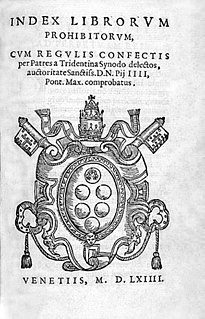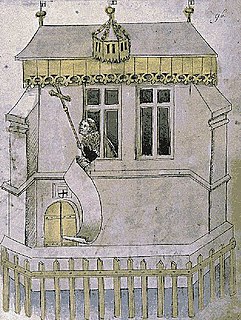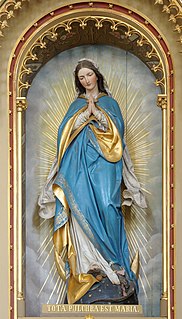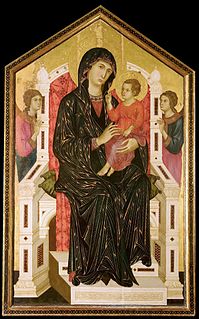It has been suggested that this article be merged into Index Librorum Prohibitorum . (Discuss) Proposed since July 2022. |
Officiorum ac Munerum was an Apostolic Constitution issued by Pope Leo XIII on 25 January 1897. [1]
It has been suggested that this article be merged into Index Librorum Prohibitorum . (Discuss) Proposed since July 2022. |
Officiorum ac Munerum was an Apostolic Constitution issued by Pope Leo XIII on 25 January 1897. [1]
In 1753 Pope Benedict XIV issued the bull "Sollicita ac Provida" which uniformly regulated the process for conducting cases concerning literary productions. Benedict stated that his reason for publishing this constitution was the many unjust complaints against the prohibition of books as well as against the Index. During the Vatican Council, great efforts were made, especially on the part of the French and Germany bishops, to induce the assembled Fathers to mitigate the ecclesiastical laws relating to censorship, but before this question could be discussed, the council was dissolved.
Leo XIII took it upon himself to reorganize the ecclesiastical legislation in this respect, which he accomplished by the Constitution, "Officiorem ac Munerum". Since that time, for all literary matters, for censorship and prohibition of books, Of former enactments, the Bull "Sollicita ac Provida" alone has been retained; together with the new Bull, "Officiorem ac Munerum" it forms the first and general part of the Leonine Code, whereas the second and larger, but not therefore more important, part comprises the special, alphabetically arranged catalog of books forbidden by particular decrees since 1600. [2]

Pope Benedict XIV, born Prospero Lorenzo Lambertini, was head of the Catholic Church and ruler of the Papal States from 17 August 1740 to his death in 1758.
Gaudium et spes, the Pastoral Constitution on the Church in the Modern World, is one of the four constitutions resulting from the Second Vatican Council in 1965. It was the last and longest published document from the council and is the first constitution published by an ecumenical council to address the entire world. Gaudium et spes clarified and reoriented the role of the church’s mission to people outside of the Catholic faith. It was the first time that the church took explicit responsibility for its role in the larger world. The constitution's creation was necessitated by fear of the church’s irrelevance in the modern era due to its ignorance on problems that plague the modern world. The document represents an inner examination of the church by the council and features a response to problems affecting the modern world.

Pope Pius VI was head of the Catholic Church and ruler of the Papal States from 15 February 1775 to his death in 1799.
Pope John XIII was the bishop of Rome and ruler of the Papal States from 1 October 965 to his death. His pontificate was caught up in the continuing conflict between the Holy Roman emperor, Otto I, and the Roman nobility. After long and arduous negotiations, he succeeded in arranging a Byzantine marriage for Otto II, in an effort to legitimize the Ottonian claim to imperial dignity. He also established church hierarchy in Poland and Bohemia.

The Index Librorum Prohibitorum was a list of publications deemed heretical or contrary to morality by the Sacred Congregation of the Index, and Catholics were forbidden to read them.
Decretals are letters of a pope that formulate decisions in ecclesiastical law of the Catholic Church.

Humanum genus is a papal encyclical promulgated on 20 April 1884 by Pope Leo XIII.

The history of the Catholic Church is integral to the history of Christianity as a whole. It is also, according to church historian, Mark A. Noll, the "world's oldest continuously functioning international institution." This article covers a period of just under two thousand years.

Pedro Martínez de Luna y Pérez de Gotor, known as el Papa Luna in Spanish and Pope Luna in English, was an Aragonese nobleman, who as Benedict XIII, is considered an antipope by the Catholic Church.

Habemus papam is the announcement traditionally given by the protodeacon of the College of Cardinals or by the senior cardinal deacon participating in the papal conclave, in Latin, upon the election of a new pope of the Roman Catholic Church.
Tomás Sánchez was a 16th-century Spanish Jesuit and famous casuist.
Bullarium is a term commonly applied to a collection of papal bulls and other analogous documents, whether the scope of the collection be general in character, or limited to the bulls connected to any particular order, or institution, or locality.
Ecclesiastical letters are publications or announcements of the organs of Roman Catholic ecclesiastical authority, e.g. the synods, but more particularly of pope and bishops, addressed to the faithful in the form of letters.
Censorship was an essential element of Portuguese national culture throughout the country's history up until the Carnation Revolution in 1974. From its earliest history Portugal was subject to laws limiting freedom of expression. This was mainly due to the influence of the Church since the time of Ferdinand I, who requested that Pope Gregory XI institute episcopal censorship. Later, the censorship would also apply to the publication of other written works. Portuguese citizens still remember the Estado Novo's censorship policy, institutionalizing strict control over the media, resorting to measures used previously against newspapers and systematic sequestering of books. In fact, every political regime was very careful with the legislation related to the area of press freedom—in most cases restricting it. In the five centuries of the history of Portuguese press, four were marked by censorship.
In the Roman Catholic Church, Theologian of the Pontifical Household is a Roman Curial office which has always been entrusted to a Friar Preacher of the Dominican Order and may be described as the pope's theologian. The title was formerly known as the Master of the Sacred Apostolic Palace before the changes implemented in Pope Paul VI's 1968 apostolic letter Pontificalis Domus.

The Mariology of the popes is the theological study of the influence that the popes have had on the development, formulation and transformation of the Roman Catholic Church's doctrines and devotions relating to the Blessed Virgin Mary.

Mariological papal documents have been a major force that has shaped Roman Catholic Mariology over the centuries. Mariology is developed by theologians on the basis not only of Scripture and Tradition but also of the sensus fidei of the faithful as a whole, "from the bishops to the last of the faithful", and papal documents have recorded those developments, defining Marian dogmas, spreading doctrines and encouraging devotions within the Catholic Church.
Divinum illud munus is an encyclical issued by Pope Leo XIII on May 15, 1897. In the encyclical, Leo addresses "the indwelling and miraculous power of the Holy Ghost; and the extent and efficiency of His action, both in the whole body of the Church and in the individual souls of its members, through the glorious abundance of His divine graces." As such it serves as one of the precursors to the Catholic pneumatological renaissance of the twentieth century.

The Council of Perpignan, which was intended to be a general council of the entire Catholic Church, was convened in November 1408, by Pope Benedict XIII of the Avignon Obedience. The site of the council was the city of Perpignan, which belonged to the Crown of Aragon, which was still in the Avignon Obedience after the withdrawal of French support from Benedict XIII in 1408.
Censorship of the Bible includes restrictions and prohibition of possessing, reading, or using the Bible in general or any particular translation of it. Violators of those Bible prohibitions have been punished by killing, imprisonment, forced labor, and banishment, as well as by burning or confiscating the Bible or Bibles used or distributed. Censorship of the Bible occurred in the past and is still going on today.